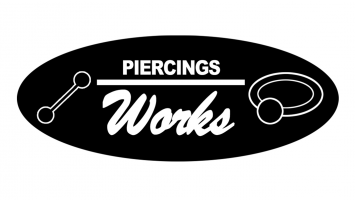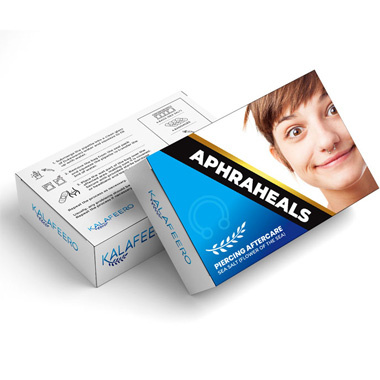How do you prepare a saline soak and how does it promote the healing process of a piercing?
Why is a saline soak so good for your piercing? Salt promotes healing and helps fight infections. Just like animals, we have a salt storage under the skin. When skin is damaged or when suffering from inflammation, the subcutaneous salt lumps together and the production of macrophages is activated. Macrophages are cells that help fight infection.
So I might as well sprinkle a bunch of salt in every wound?
No, it's not quite the same. Salt only has healing properties when it can be used by the body in small amounts. In addition, not every type of salt is effective. Kitchen salt is different from sea salt. Even though kitchen salt could have a positive effect on wounds, we strongly advise you to use sea salt.
Many types of sea salt contain minerals and therefor promote healing. Sea salt can be bought in most grocery stores and can be recognized by the large coarse grains. When you dissolve (sea) salt in water and bring it in contact with the wound, an extra boost of salt is released in the wound, which further encourages the production of the macrophages.
Keep in mind that a saline soak is a tool and not a miracle cure.
How do I make a sea salt soak?
The opening of the glass must be wide enough to fit over the piercing and draw a vacuum. If necessary, you can also use a mug or a bowl instead of a longdrink glass.
Make sure the water is warm enough to completely dissolve the salt. Keep in mind that the water must be cooled off before using the salt solution.
Fill a longdrink glass / mug / bowl with 250 ml of warm water. Then add 1/4 to 1/2 a teaspoon sea salt and stir until the salt is dissolved. It's preferred to use boiling water. This way the salt dissolves completely and the water is disinfected. Now let the glass of water cool down.
If the water has reached the desired temperature and is in the right glass you may press the glass against your body to form a seal. How exactly you use the salt solution depends on the piercing body part.
When you are finished using the salt solution, it is very important to rinse with plain water afterwards. You can do this the same way as done with the salt solution, but make sure to use clean water this time. If you re-use the same glass or cup, it is important that it is clean and there is no salt left in the cup.
Repeat soaking in clean water until all the salt is rinsed off. If you have cleaned it properly, you can dry the skin and the piercing.
Different piercings:
Belly piercing and nipple piercing
Bend over and press the glass on the nipple or the navel. If done properly, a vacuum will be created. Then hang back (or lie down) so the belly piercing is completely covered. Leave it for 2 to 3 minutes. Make sure you have a clean towel handy to catch any water that escapes.
Nose, eyebrow, lip and ear piercings
Prepare the saline solution in a long glass or a shallow bowl. Then hang your ear piercing, nose piercing, lip piercing or eyebrow piercing in the water for a few minutes (2-3) while holding the glass up straight. Remember to consistently breathe through your mouth with a nose piercing. This can be a bit uncomfortable and may look a little stupid, but don't let that put you off.
Other piercings
It is always best to have your piercing fully immersed in the water. If that does not work you can try the following:
For piercings that are more difficult to reach, it will be easiest to dip a sterile gauze in the solution and dab it on the piercing. Make sure the solution covers the entire area.
Many people are inclined to stop using the saline soaks because they find it too much hassle. Depending on your piercing it can be a little awkward. Nevertheless, we would like to emphasize the importance of saline soaks. Especially when dealing with new piercings in the beginning of the healing period, a salt bath can offer a great solution. The effect is not noticeable until later, so keep this in mind and be patient.
Aphraheals - Piercing Aftercare



